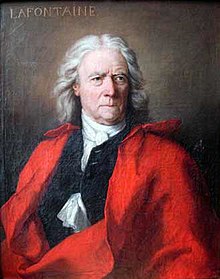|
August Lafontaine
August Heinrich Julius Lafontaine (5 October 1758 – 20 April 1831) was a German novelist. BiographyLafontaine was born and brought up in Brunswick, the son of the court painter Ludolph Lafontaine and his fifth wife, the court maid-in-waiting Sophie Elisabeth Thorbrügge. He was educated in Helmstedt, where he studied theology, but took no degree.[1] He then acted as a private tutor until 1789. In 1792, he served as a field chaplain in the Prussian army, and in 1800 settled in Halle. He became canon of the Magdeburg Cathedral as a reward for the dedication of one of his books to Friedrich Wilhelm III and Luise.[2][3] WorksThe popularity of his novels, which are sentimental and didactic tales of domestic life, was remarkable.[2] In his lifetime, he was the most popular German novelist, his works surpassing by far the popularity of his contemporary Goethe's.[1] He wrote over 150 volumes, using the pseudonyms Gustav Freier, Miltenberg or Selchow.[3] His novels' tone of conservative moralizing sentimentality was regarded with high favor at the court of Prussia.[4] Far less impressed was August Wilhelm Schlegel, writing in Athenaeum in May 1798: "He has indeed become a favourite writer. Lafontaine can never be more than that.... [for his work] lacks poetry, spirit, and romantic verve."[1] Among his more popular works are:[2]
References
|
||||||||||||||
